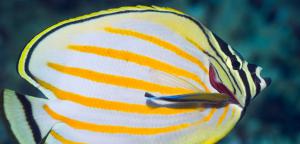Content:
Cheaters never prosper, unless there’s a motorboat buzzing by.
That’s what a new study found when looking at the interactions between bluestreak cleaner wrasses and other fish on coral reefs in the South Pacific. It’s the first time scientists have seen ocean noise impact a fish’s relationships with other species.
The typical cleaner wrasse makes its living by nibbling parasites off other fish. A wrasse hangs out at an established “station” on a reef that other fish visit for cleaning. By eating the parasites, the wrasse gets a meal and the client gets a clean bill of health. Everyone leaves happy unless the wrasse cheats and takes an extra treat—a nibble of tasty skin mucus or even a living scale. When that happens, the client usually punishes the wrasse by instantly giving chase. The wrasse, in turn, is more “honest” in its subsequent interactions with that fish, taking fewer extras, at least for a while.
Cheating isn’t random. Wrasses will cheat predatory fish far less often, for instance. And they’re more likely to steal extra snacks off client fish that live in a small section of the reef rather than from species that move around the reef and have their choice of cleaners. Wrasses are canny entrepreneurs with nuanced relationships.


